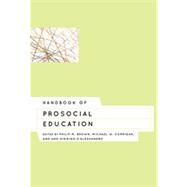Handbook of Prosocial Education
, by Brown, Philip M.; Corrigan, Michael W.; Higgins-D'Alessandro, Ann- ISBN: 9781442211193 | 1442211199
- Cover: Hardcover
- Copyright: 10/12/2012
Handbook of Prosocial Education is the first definitive source on character education, social-emotional learning, and school climate improvement. Each chapter includes discussions of practices and models of education as well as theory and research that grounds these approaches. Case studies add the voices and insights of practitioners with experience in adopting, implementing, and evaluating prosocial education school reform strategies. Using the prosocial education umbrella, the editors have brought together a host of first-rate researchers, educators, and practitioners to provide a convincing body of knowledge arguing for the importance of the social development of young people in American public schools, using history, research and current practice. Part 1 defines prosocial education conceptually and examines its historical roots and the history of support for related research. This section is completed with a review of contemporary efforts to foster and define best prosocial educational practices and provides a summary of how theory drives program creation and design. Part 2 presents a comprehensive view of the fields and themes that represent the content of prosocial education. In thirteen chapters and thirty-three accompanying case studies, contributors provide the reader with accessible summaries of theory, concepts, and research for the topic or program area, and at least two examples for each topic of high-quality practice written by educators and practitioners chosen because they have been recognized for their achievements, creativity, and effective leadership. Part 3, Voices from the Field, offers the reader the opportunity to hear four distinctive voices regarding how their roles facilitate prosocial approaches to student development and well-being. The positions represented include the viewpoints and experience of a district superintendent, school principal, teacher, and student services support staff. Part 4 summarizes the evidence presented elsewhere in the book and reviews some key issues on which researchers need to focus to ensure prosocial strategies and education are elevated to the next level of credibility and practice. The final chapter provides a perspective and a critique of the history of educational policy through a prosocial lens, and ends with recommendations for policy makers and thoughtful educators.







